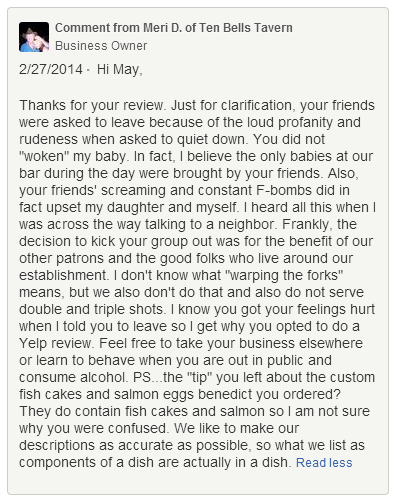While customer reviews can play a major role in your online reputation, it’s not entirely out of your hands. There are some things that businesses do that can negatively affect their reputations. Your reputation isn’t just in the hands of customers and the people that find their reviews. You have some power to improve or negatively affect your own online reputation.
1. Ignoring Your Reputation
This is one major mistake many business owners make. They assume there’s no time for worrying about their online reputation especially if their business involves a lot of in person interaction. If the person to person relationships are strong and those customers continue to come back, you may think that you’re doing everything necessary to run your business. But by ignoring your online reputation, you are leaving yourself wide open to something going wrong and negatively affecting your business without you realizing it.
Many of the review websites and business directories work hard to collect information about local businesses to flesh out their database and you could have several profiles out there that you didn’t set up yourself. If you don’t pay attention to your online reputation that doesn’t mean other people aren’t. Someone could leave a bad review that can paint a negative picture of your business. On the flip side, someone could leave a positive review that you won’t be using to your benefit.
However, when it comes to an online reputation, not having one can be more detrimental than having a bad one. If someone attempts to do research about your business and doesn’t find any information, it can lead them to believe that your business doesn’t have customers. At least if you have bad reviews out there it shows that customers are patronizing your business even if they’re not having great experiences. It’s not a good idea to have no online reputation so you can’t just ignore it.
2. Getting Angry and Being Rude in Response to Bad Reviews
Yes, getting bad reviews can feel terrible especially if the person is very detailed about the negative experience in a not so constructive way. You may want to take some kind of defensive action in response to a bad review. It’s understandable that you may want to plead your case or defend your position. Unfortunately that can sometimes lead to you lashing out or being rude in response to the bad reviews, especially if the customer really picks your business apart in the process.
Don’t be rude even if you feel justified doing so. You don’t have to respond to a bad review immediately. Give yourself some time to digest it. Walk away from it. If you can’t stop yourself from responding negatively, have someone else manage company reviews. Your reaction isn’t wrong but acting on that reaction is wrong. Below is an infamous example from a New York restaurant and a garage door company that shows responses to negative reviews that didn’t really help improve their reputation very much:
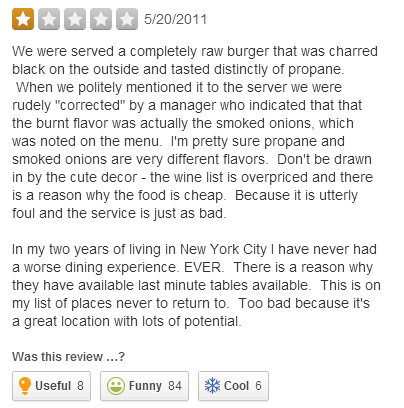
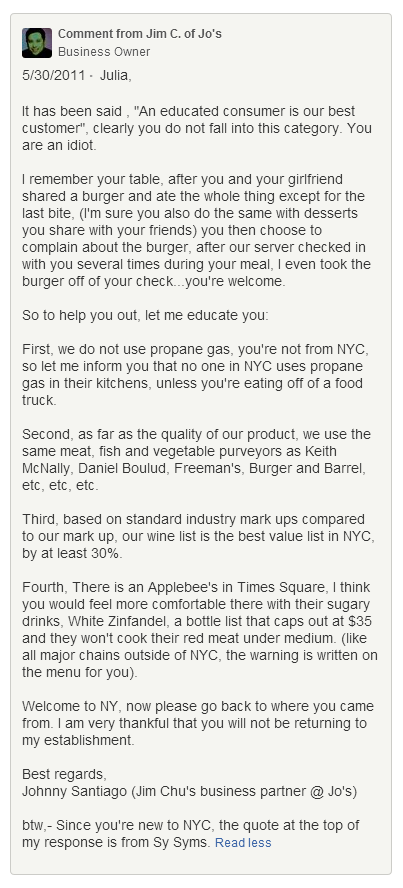
It’s important that you are honest with yourself about what you’re good at and what you need help with. You can be a great speaker and a not so great writer. It’s OK if you aren’t a top notch writer or if you’re very blunt in your communication. But if that’s the case, you shouldn’t write responses to online reviews.
Get someone else to handle it. Make sure that person is a good writer and knows how to put emotion to the side and address negative reviews with a positive outlook in mind. Negatives can be turned into positives as long as you don’t feed into the negativity.
3. Allowing a Bad Review to Escalate into a Back and Forth Disaster
Speaking of feeding into the negativity, the next worst thing is to respond rudely and get into a back and forth debate with the customer. Not only will this not make your business look good, it will make people question your integrity as a person. Whenever a business owner gets into an online disagreement with a customer, it looks like the big guy is being mean to the little guy.
Even if your business is a small shop and you’re the only person handling everything, you’re still considered the big guy because you’re a business. Don’t beat up on the little guy no matter how angry or upset you may get.
You love your business. You put your heart and soul into it. But you aren’t perfect. Mistakes can happen. Bad days can happen. It’s tough enough when you have those moments and you have to deal with them yourself. It’s even tougher when a customer takes you to task for a mistake or bad day.
Your first reaction may be to respond to the negative review. Some customers leave bad reviews then never return to them. If you respond to it, your response may be the last one people see. But in some cases the customer is keeping an eye on the review. When you leave a response to a review, that customer may return and leave another response to yours.
If you’re in the heat of the moment, you may be inclined to respond again. That could lead to a back and forth interaction that will ultimately be disastrous for your business. You know it’s not a good idea to allow someone to pull you into a negative interaction in your personal life. The same goes for your business.
Don’t be like this business owner that made it a point to respond to the negative reviews posted about his business in equally negative ways. Below is a screenshot of one of his exchanges with customers:
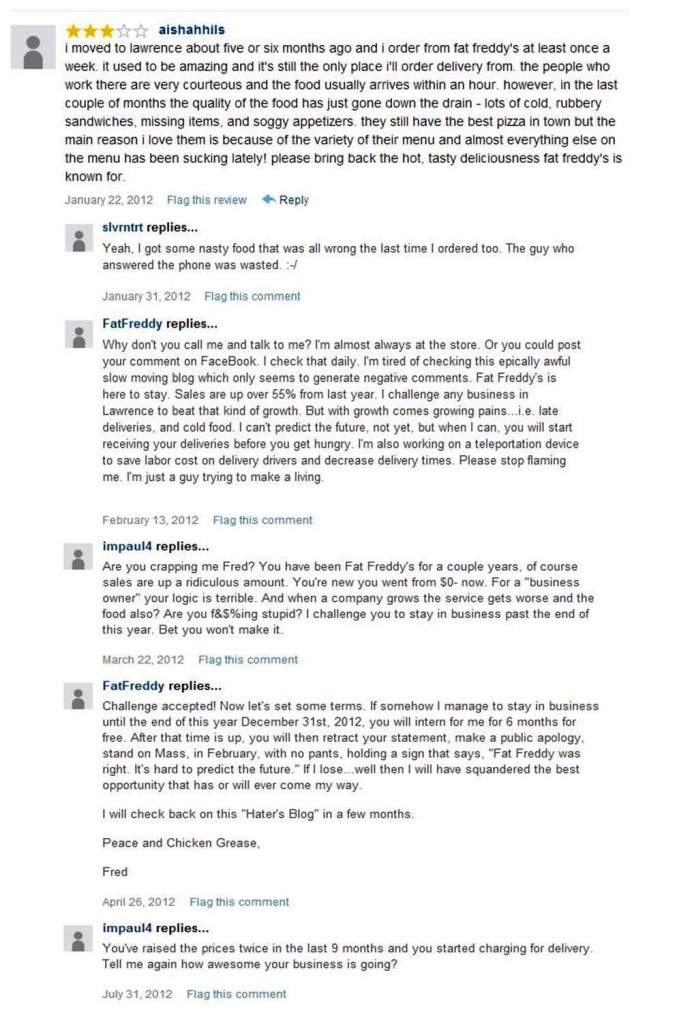
Can you see how the owner of this particular establishment went wrong with his responses to the negative reviews?
Rather than rising above them and using them as a way to boost business, he got into a name calling, back and forth with customers. It did nothing to help his business and painted a pretty negative picture. The business is still currently up and running and appears to be growing so this didn’t completely ruin things, but it doesn’t help that it’s out there affecting the online reputation of a business that’s only been around for a few years.
4. No Strategy
Some businesses become aware of the importance of keeping an eye on their online reputation and they begin to monitor it religiously. While it’s important to know what’s going on with your business online, that’s not a strategy. Watching what’s going on and occasionally responding to negative responses isn’t an actual strategy.
You have to take the time to map out how you will address your online reputation and use it to grow your business. Your online reputation is something that needs to be consistently managed and is a valuable marketing tool. It’s not something you can tackle only when it becomes an issue or when someone tells you it should be managed.
You need to create a complete online reputation strategy. Not having a strategy is just as bad as ignoring it. Here is an example of a business that obviously has no strategy:

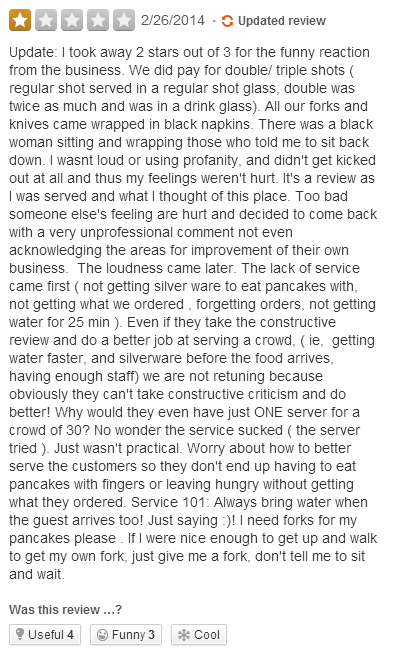
5. Not Training Office Staff for Online Reputation
As the business owner you are often really aware of what’s going on and how that affects the big picture. While you are aware of the need for online reputation management and may even have a strategy in place, you have to train your office staff and employees on its importance as well.
Sometimes a business can suffer from a negative online reputation because of a mistake made by an employee and not the business owner.
Roofing Phoenix – 1 star
i called for an estimate five times first person to answer was a guy that said “hello who dis” then was hung up on called again was hung up on three more times, called again spoke with girl told her what i was looking for she then transfered me to another girl who hung up on me, called a fifth time girl picked up told her that i wanted an estimate for a tear off and reroof she said they were to busy to do it and hung up on me again…bad bad first impression, i will never use this company for any reason what so ever.
The first person who has any contact with potential new customers is the person answering the phone. While this example is an extreme exaggeration of how a professional business should not answer the phone there are hundreds of reviews left for businesses who are not even customers. Answering the phone may not seem like an important job on the surface, but in reality it is one of the most important positions in your business for getting potential new customers in the door. The person answering the phone should be prepared to answer with a positive attitude no matter what is happening in the office. A consistent greeting with the name of the person answering the phone, the name of the business, and a question like, “How can I help you”? This may sound basic, but after doing some review research you would be amazed at the number of businesses who don’t do this. They should also be prepared to answer the most frequently asked objections for whatever your service provides. Would you like to track how well the office staff answers the phone? This can be done with a phone tracking service that records the phone calls you receive. If the person answering the phone will ask how the potential new customer heard about your business you can also use this as a way to track your ROI for your advertisement campaigns.
It’s imperative that your staff be trained for their role in your complete reputation strategy. Your staff is responsible for directly working with your customers. They should not only be providing outstanding customer service, but they should know the importance of establishing that relationship with customers that will make them want to tell everyone about the experience they have had at your business. If you don’t train your employees on best practices as it relates to your online reputation strategy, you may experience some negative effects of their lack of knowledge.
Don’t assume your employees know what should and shouldn’t be done. Put a policy in place and train them on it. That way you are doing your best to protect your company from a negative reputation situation. Even though large corporations have their brand marketing departments, they still have to address their specific strategy because small issues can quickly become a problem situation.
Be careful not to let your business end up in a similar situation. You may not be able to stop and address it right away. But even if you do, that doesn’t mean it goes away. It’s still online and will still show up in search results. If you want to see a quick example, stop and do a web search for “US Airways tweet”. You will likely see at least one result with an article about a how small issues can quickly become a big situation.
6. Getting Fake reviews from Friends or Employees
When you begin to see the value of online reviews you may be tempted to ask friends or employees to post fake positive reviews to encourage other people to follow suit. Don’t do that. Yes you may get away with it and those reviews will eventually be pushed down by the real reviews that you should be working to get.
But it’s a risky situation. If anyone ever finds out that you posted fake reviews, it could go from good to bad really quickly. The thing about online reviews is that they’re often anonymous and it can be tough to verify whether the person posting them is an actual customer or a plant. All it takes is an accusation of fake reviews for people to begin to doubt you.
One quick way to check is to click on the profile name of those who left the review. If you see that they only have that one review then it looks suspicious.
Plus, posting fake reviews is akin to false advertising which can be considered fraud. If someone decides to they can bring charges against your business for fraud, the negative exposure can really cause problems for your business down the line even if the lawsuit doesn’t result in you having to pay a judgment. Once it’s been demonstrated that you post fake reviews, people will be much less likely to believe the legitimate ones.
It’s not a risk worth taking. Put together a strategy for generating legitimate positive reviews and do it the right way. Don’t try to rush the process at the risk of your business reputation.
When you realize just how beneficial it can be to have a positive online reputation, it may make you really focused on doing what it takes to make sure your reputation is and stays positive. This desire for success may cause you to make choices that can have long term negative effects on your business especially if you are building a small business and everything is a make or break situation.
How does your online reputation stack up? Check out our Reputation Checklist for a complete self evaluation of your online reputation.
Josh Reed
Best Selling author of “Complete Reputation Authority“

